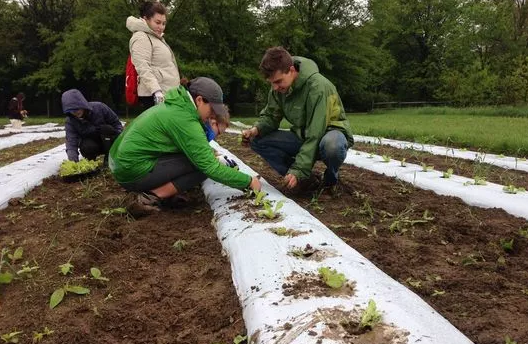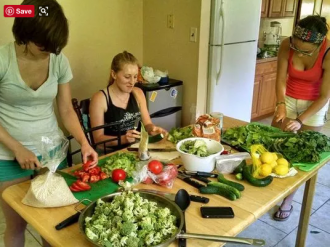Unique Food Co-op Turns UD Students into Farmers


For most University of Delaware students, Monday dinner means dining hall pizza, or a hurried bowl of cereal while studying.
But for a select group, Monday meals often consist of roasted root vegetables and homemade hummus — food they not only cooked, but also helped plant, grow and harvest.
These students belong to the Down to Earth Food Cooperative, a Newark community food collective founded in September 2012. In return for weekly dinners, the group’s 72 members — who are both students and residents — spend at least five hours a semester working at Flying Plow Farm in Rising Sun, Maryland, and 10 hours contributing in other forms, such as cooking, cleaning or menu planning.
Down to Earth is not a traditional co-op — it does not operate as a community grocery store or retail business because it does not, as of yet, have a permanent location. Its system is far more grassroots, with weekly dinners hosted at the homes of different members.
Once a month, it also hosts “community dinners” at Newark Natural Foods, which anyone can attend — as long as they bring a locally sourced vegetarian dish or donation.
Although the group’s members are primarily UD students, the cooperative opted to register as a nonprofit rather than as a UD student organization.
So, unlike the student food co-ops at Temple University and University of Maryland, which have on-campus locations and receive institutional funding, Down to Earth has had to make it on its own.
Kathryn Wheeler, another senior board member, sees the group’s engagement with the larger Newark community, rather than just UD, as an asset.
“It’s a way that UD students can get out of their bubble,” Wheeler said. “I know without DTE I wouldn’t understand what living in Delaware, or Newark, really means.”
Beginning in the fall, DTE will have a semi-permanent address at a house where several members will live. Nora Reynolds, a UD alum and Wilmington resident who also serves on the board, said she believes this will expand the organization’s connection to the community, because it will become a location for Flying Plow Farm supporters to pick up their community-supported agriculture (CSA) shares.
Maybe these shares will allow some Newark residents to access organic, locally-grown produce for the first time, she said, and become more involved in the food system.
“I think there’s this really empowering feeling, for everybody, when you sit down to dinner, surrounded by this community of people, and you see a potato, or a radish, or okra on your plate, and you’re thinking, ‘I remember planting that, or I remember weeding that,’” Reynolds said. “You literally see the food system from the seed to when it’s on your plate. It helps you understand how it works, and puts food in general in perspective.”
Down the road, board members—who emphasized that, because the group is a completely democratic cooperative, all members have equal say in its future—envision the organization becoming more advocacy-focused.
They want to talk more about food justice, and social justice in general, said Rachel Coyne, a senior board member. Eventually, they may develop into a housing cooperative as well, to encourage more affordable, community-based housing in Newark.
In the meantime, members of the student-run nonprofit will continue promoting the importance of local, organic food and getting one’s hands in the dirt. It will host its next community dinner at Newark Natural Foods on April 14.
“I think part of being a healthy, productive human being is about having a space where you feel like people care about you and having nutritious food,” Reynolds said. “DTE feeds the soul and the stomach. It sounds a little cheesy, but it’s true.”
Contact writer Meghan Jusczak at mjusczak@delawareonline.com
Delaware Online – The News Journal
Photos: Down to Earth Food Co-op members planting and protecting crops during a farm shift. Courtesy of Kathryn Wheeler.
DTE members begin the process of cooking a weekly dinner. Courtesy of Kathryn Wheeler.







